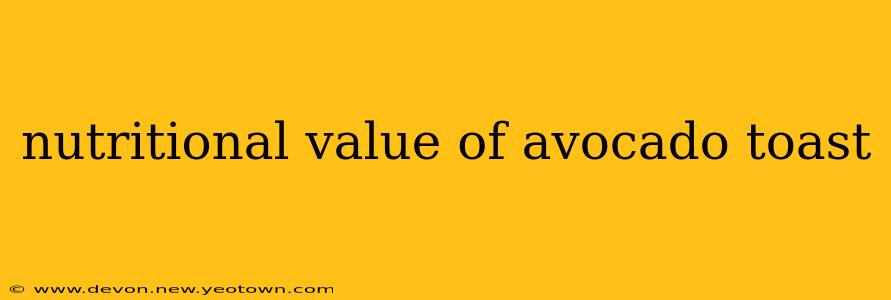The Unexpected Nutritional Powerhouse: Unpacking the Nutritional Value of Avocado Toast
Avocado toast. The trendy brunch staple, the Instagram-worthy snack, the surprisingly nutritious meal. But beyond the aesthetically pleasing photos, what's truly inside this seemingly simple dish? Let's dive into the nutritional value of avocado toast, exploring its benefits and variations.
Imagine this: a perfectly toasted slice of whole-wheat bread, creamy avocado spread generously across the top, maybe a sprinkle of flaky sea salt, a dash of red pepper flakes for a little zing. It's a simple pleasure, but one packed with a surprising array of nutrients.
What are the main nutritional benefits of avocado toast?
The magic lies in the combination of the avocado and the bread. Whole-wheat bread provides fiber, which aids digestion and helps regulate blood sugar levels. Avocados, however, are the real stars of the show. They're bursting with healthy fats (monounsaturated fats, to be precise), which are crucial for heart health. They’re also an excellent source of potassium, a vital mineral often overlooked, and a good source of Vitamin K and folate. The combination creates a surprisingly well-rounded and nutritious meal or snack, depending on portion size and additions.
Is avocado toast a healthy breakfast?
Yes, avocado toast can absolutely be a healthy breakfast option. However, the "healthiness" depends heavily on the ingredients and portion size. Opting for whole-wheat bread significantly increases the fiber content, making it more satiating and better for blood sugar control compared to white bread. Adding other healthy toppings like a sprinkle of everything bagel seasoning, a drizzle of olive oil, or some sliced tomatoes can further boost its nutritional profile. Conversely, loading it up with excessive amounts of cheese, bacon, or creamy sauces can negate many of its health benefits. Moderation is key!
What are some healthy toppings for avocado toast?
The beauty of avocado toast lies in its versatility. Beyond the basics, you can elevate your toast with an array of healthy toppings to boost its flavor and nutritional value. Consider:
- Everything Bagel Seasoning: Adds a savory crunch and a variety of spices.
- Sliced Tomatoes: Provide extra vitamins and antioxidants.
- Red Pepper Flakes: Add a touch of spice and a boost of Vitamin C.
- A sprinkle of chia seeds or flax seeds: These add fiber and omega-3 fatty acids.
- A poached egg: Provides protein and choline.
- Smoked Salmon: Adds protein and healthy omega-3 fatty acids.
How many calories are in a typical slice of avocado toast?
The calorie count can vary significantly depending on the ingredients and portion sizes. A slice of whole-wheat toast with about half an avocado could range from 250-350 calories. Adding toppings will naturally increase the calorie count. It's always a good idea to be mindful of your portion sizes and track your calorie intake if weight management is a goal.
Is avocado toast good for weight loss?
Avocado toast can be part of a weight-loss diet, but it's not a magic bullet. The healthy fats in avocado can actually help you feel full and satisfied, potentially reducing overall calorie intake throughout the day. However, portion control remains vital. Overindulging in avocado toast, particularly with high-calorie additions, could hinder weight-loss efforts. Balance is essential—include it as part of a balanced, calorie-controlled diet and lifestyle.
Can I eat avocado toast every day?
While avocado toast is nutritious, eating it every day might not be the most diverse approach to nutrition. Variety is key to a balanced diet, so it's best to incorporate it as part of a wider range of healthy foods. Overdoing any single food, even a healthy one, can lead to nutritional imbalances.
In conclusion, avocado toast, when prepared thoughtfully, offers a delicious and nutritious meal or snack. By focusing on whole-wheat bread and choosing healthy toppings, you can enjoy the delightful flavors while reaping the benefits of healthy fats, fiber, vitamins, and minerals. Remember to practice moderation and incorporate it into a balanced diet for optimal health.

